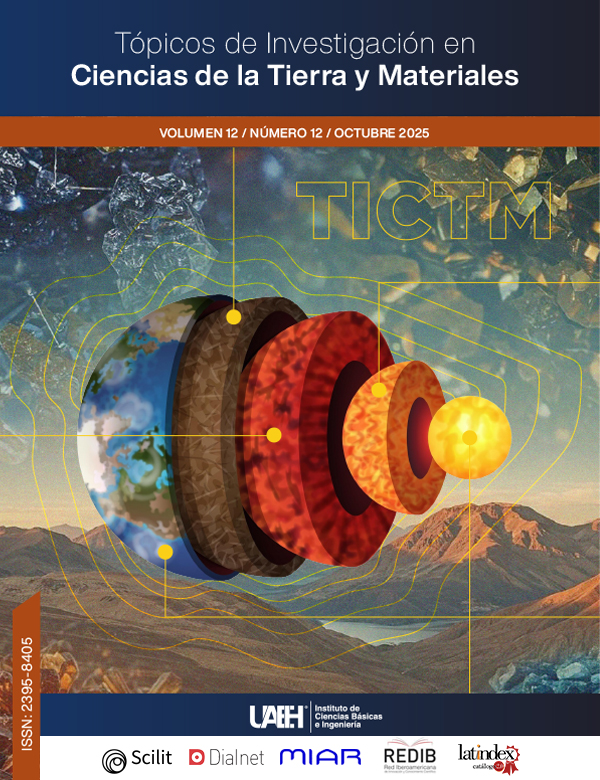Efecto de la temperatura de revenido sobre la microestructura y dureza en árboles de levas de hierro dúctil
DOI:
https://doi.org/10.29057/aactm.v12i12.15216Palabras clave:
Hierro dúctil, austenitizado, temple, revenido, microestructura, austenita retenida, durezaResumen
Los hierros dúctiles son utilizados en diversos componentes automotrices como los árboles de levas, los cuales son sometidos a un temple por inducción para incrementar su dureza en la periferia. En este trabajo se determinó el efecto de diferentes temperaturas de revenido sobre árboles de levas templados en aceite para incrementar su dureza. Se utilizaron árboles de levas modelo exhaust para motor 3.6L y se caracterizaron microestructural y mecánicamente en estado de colada, templados en aceite y revenidos a temperaturas de 200, 300 y 500 °C. La microestructura obtenida del temple fue de nódulos de grafito inmersos en una matriz de martensita con austenita retenida, mientras que al finalizar los revenidos de 200 y 300 °C de martensita revenida con finos carburos, y con el revenido de 500 °C de martensita revenida, ferrita y carburos. En adición, la mayor dureza fue obtenida con el temple con un valor de 54.35 HRC la cual disminuyo con los revenidos obtenido valores de 48.01, 45.21 y 31.85 HRC para las temperaturas de 200, 300 y 500 °C, respectivamente.
Descargas
Citas
ASM Handbook committee (1991). ASM handbook volume 4 heat treatment. ASM International, Alabama, E.U.
ASTM E 18, 2022. Standard Test Methods for Rockwell Hardness and Rockwell Superficial Hardness of Metallic Materials. ASTM International.
Bai, J., Xu, H., Wang, Y., Chen, X., Zhang, X., Cao, W., Xu, Y. (2002). Microstructures and Mechanical Properties of Ductile Cast Iron with Different Crystallizer Inner Diameters. Crystals, 12 (413), 1-15.
DOI: 10.3390/cryst12030413
Bai, J., Xu, H., Chen, X., Cao, W., Zhang, X., Xu, Y. (2023). Effect of tempering temperature on the wear behaviour of martensitic ductile iron. Materials Science and Technology (United Kingdom), 39 (6), 744–755.
Balachandran, G., Vadiraj, A., Kamaraj, A., Kasuya, E. (2011). Mechanical and wear behavior of alloyed gray cast iron in the quenched and tempered and austempered conditions. Materials and Design, 32, 4042-4049.
DOI: 10.1016/j.matdes.2011.03.054
Bayrakceken, H., Ucun, I., Tasgetiren, S. (2005). Fracture analysis of a camshaft made from nodular cast iron. Engineering Failure Analysis, 13, 1240-1245.DOI: 10.1016/j.engfailanal.2005.11.001
Colin-García, E., Villanueva-Ruiz, M.A., Suarez-Rosales, M.A., Téllez-Ramírez, J., Magaña-Hernández, A., Cruz-Ramírez, A. (2024a). Comportamiento microestructural y de dureza en árboles de levas fabricados de hierro dúctil bajo diferentes medios de temple y revenido. Pädi Boletín Científico De Ciencias Básicas E Ingenierías Del ICBI,13 (25).
DOI: 10.29057/icbi.v13i25.13212
Colin-García, E. Sánchez-Alvarado, R.G., Cruz-Ramírez, A., Suarez-Rosales, M.A., Portuguez-Pardo L., Jiménez-Lugos J.C. (2024b). Effect of regular thickness on the microstructural and quantitative analysis for a hypo-eutectic ductile iron alloyed with Ni and V. Journal of Mining and Metallurgy Section B: Metallurgy, 60 (1), 15-31.
DOI: 10.2298/JMMB231114002C
Druschitz, A. P., Thelen, S., (2002). Induction Hardened ductile iron camshafts. SAE 2002 World Congress, Detroit Michigan, March 4-7,1-9.
Hoang A. T., Nguyen H. H., Nguyen H. D., Tran T. N., Nguyen D. N., 2022. Austenitization and formation of ausferrite structure in austempered ductile iron with dual matrix. Materials Research Express 9, 1-10.
DOI: 10.1088/2053-1591/ac6730
Hu, Z., Liu, C., Du, Y., Wang, X., Zhu, X., Jiang, B. (2022). Effects of tempering temperature on mechanical and tribological behavior of ductile iron. Lubricants, 10, 1-13.
DOI: 10.3390/lubricants10120326
Kumar, R., Behera, R. K., Sen, S. (2015). Effect of tempering temperature and time on the strength and hardness of ductile cast iron. IOP Conference Series: Material Science and Engineering, 75, 1-10.
DOI: 10.1088/1757-899X/75/1/012015
Li, S., He, M., Hu, G., Tian, Y., Wang, C., Jing, B., Ping, D. (2022). Pearlite formation via martensite. Composites Part B: Engineering, 238, 109859. DOI: 10.1016/j.compositesb.2022.109859
Ma, H., Bowers, R. J., Northwood, D. O., Sun, X., Bauerle, P. J. (2012). Residual Stress and retained austenite in induction hardened ductile iron camshafts. WIT Transactions on Engineering Sciences 16, 115-127.
DOI: 10.2495/TD120101
Mahadik, S. P., Harne, M. S., Raka, V. B. (2017). Study on the effect of austempering temperature and time on the corrosion resistance of carbidic austempered ductile iron (CADI) material. Journal of Advances in Science and Technology 13, 234-240.
Oktadinata, H., Mulyati, L.S., Sastrawan, S. (2023). Influence of tempering time on the microstructure, hardness and impact toughness of ductile cast iron. Proceedings of the 6th Mechanical Engineering, Science and Technology International conference (MEST 2022), 19 april, 99-106.
DOI: 10.2991/978-94-6463-134-0_10
Ogata, P. H., Dos Santos, F. D., Okazaki, L., Pintol, N. L., Goldenstein, H. (2012). A study on the camshaft lobe microstructure obtained by different processing. SAE 2012 world congress, Säo Paulo Brazil, October 2-4, 1-9.
Pedro, D. I., Dommarco, R. C., 2019. Rolling contact fatigue resistance of Carbidic Austempered Ductile Iron (CADI). Wear 418-419, 94-101.
DOI: 10.1016/j.wear.2018.11.005
Pulkrabeth, W. W., 2004. Introduction engine components. Prentice-Hall.USA.
Rashidi, A.M., Moshrefi-Torbati, M. (2000). Effect of tempering conditions on the mechanical properties of ductile cast iron with dual matrix structure (DMS). Materials letter 45, 203-207.
DOI: 10.1016/S0167-577X(00)00105-1
Rodríguez-Baracaldo, R., Arroyo-Osorio, J.M., Parra-Rodríguez, Y. (2016). Influencia del proceso de revenido en el comportamiento mecánico de un acero de fase dual de uso industrial automotriz. Inginiare. Revista chilena de ingeniería 24 (1), 94-101.
Sabzalipour, M., Rashidi, A.M. (2023). Machinability of martensitic and austempered ductile irons with dual matrix structure. Jorunal of Materials Research and Technology 26, 6928-6941.
DOI: 10.1016/j.jmrt.2023.09.054
Sánchez-Vergara, M.E., Campos-Silva, I.E., Bautista-Godínez, Ó.E. (2024). Tratamientos térmicos del acero. Trillas, México, pp-77-78. ISBN 978-968-24-7218-3.
Smith, W. F., Hashemi, J., 2006. Fundamentos de la ciencia e ingeniería de los materiales. Mc Graw Hill, España.
Wang, B., Han, X., Barber, G. C., Pan, Y. (2019). Wear behavior of austempered and quenched and tempered gray cast iron under similar hardness. Metals 9 (1329), 1-13.DOI: 10.3390/met912132
Descargas
Publicado
Cómo citar
Número
Sección
Licencia
Derechos de autor 2025 Eduardo Colin García, Evelin Juritzy Vergara Vázquez, Miguel Ángel Suarez Rósales, Antonio Magaña Hernández, Felix Alan Montes González, Ricardo Gerardo Sánchez Alvarado

Esta obra está bajo una licencia internacional Creative Commons Atribución-NoComercial-SinDerivadas 4.0.

















